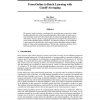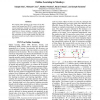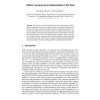117
click to vote
ML
2007
ACM
15 years 1 months ago
2007
ACM
We describe a novel framework for the design and analysis of online learning algorithms based on the notion of duality in constrained optimization. We cast a sub-family of universa...
118
click to vote
ICML
2010
IEEE
15 years 3 months ago
2010
IEEE
When equipped with kernel functions, online learning algorithms are susceptible to the "curse of kernelization" that causes unbounded growth in the model size. To addres...
123
click to vote
NIPS
2003
15 years 3 months ago
2003
We consider situations where training data is abundant and computing resources are comparatively scarce. We argue that suitably designed online learning algorithms asymptotically ...
118
click to vote
NIPS
2008
15 years 3 months ago
2008
We present cutoff averaging, a technique for converting any conservative online learning algorithm into a batch learning algorithm. Most online-to-batch conversion techniques work...
111
click to vote
AAAI
2008
15 years 4 months ago
2008
We examine online learning in the context of the Wisconsin Card Sorting Task (WCST), a task for which the concept acquisition strategies for human and other primates are well docu...
136
click to vote
COLT
2006
Springer
15 years 5 months ago
2006
Springer
We describe a novel framework for the design and analysis of online learning algorithms based on the notion of duality in constrained optimization. We cast a sub-family of universa...
109
click to vote
STOC
1997
ACM
15 years 6 months ago
1997
ACM
Abstract. We study online learning algorithms that predict by combining the predictions of several subordinate prediction algorithms, sometimes called “experts.” These simple a...
125
click to vote
ILP
2005
Springer
15 years 7 months ago
2005
Springer
Online learning algorithms such as Winnow have received much attention in Machine Learning. Their performance degrades only logarithmically with the input dimension, making them us...
109
click to vote
ALT
2008
Springer
15 years 11 months ago
2008
Springer
We consider the problem of learning to predict as well as the best in a group of experts making continuous predictions. We assume the learning algorithm has prior knowledge of the ...
135
click to vote
OSDI
2008
ACM
16 years 2 months ago
2008
ACM
Internet routing is mostly based on static information-it's dynamicity is limited to reacting to changes in topology. Adaptive performance-based routing decisions would not o...



